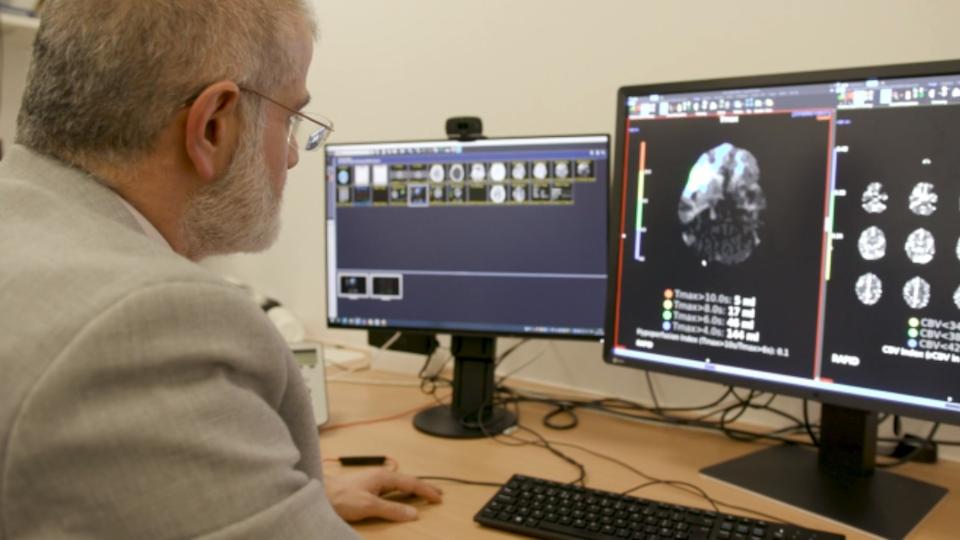NICE backs two AIs for stroke diagnosis in NHS

Dr Kurdow Nader, Consultant Neuroradiologist at University Hospitals Birmingham, using RapidAI
Two artificial intelligence-powered software tools – e-Stroke and RapidAI – have been recommended for use in the NHS to help detect stroke from CT brain scans by NICE.
The health technology assessment (HTA) agency said there is some evidence that people admitted to hospital with a suspected stroke had faster or better access to treatment after using the software, although, for now it is unclear whether that was a direct consequence of the digital technology.
Its advice is that they can be used “while further evidence is generated to help better determine their cost-effectiveness,” noting that the software is already widely used in the NHS. Some form of AI was deployed in 99 of 107 stroke units in England when its analysis was undertaken, while the remainder had been due to follow suit “before the end of 2023.”
Brainomix’s e-Stroke, for example, has been implemented in hundreds of hospitals across the UK to provide real-time interpretation of brain scans to specialist and non-specialist clinicians, to guide treatment and transfer decisions for stroke patients.
The RapidAI platform, developed by a company of the same name, also combines imaging and workflow to enable doctors to make faster triage or transfer decisions and has also rolled out across several NHS trusts, including University Hospitals Birmingham (UHB) NHS Foundation Trust.
NICE’s guidance (PDF) notes that the software should only be used with healthcare professional review and that clinical centres should keep using their current scan reporting protocols “to reduce the risk of incorrect results.”
In its cost-effectiveness modelling, NICE’s appraisal committee concluded that even a small increase in the number of people having thrombectomies – surgery to remove a blood clot from inside an artery or vein – from the use of AI software would likely make the software value for money.
The cost of the software licence for the use of e-Stroke for a comprehensive stroke centre is around £30,000 per year and for an acute stroke centre around £15,000 per year, according to the guidance, while RapiAI has an average cost per centre of around £20,000.
Another 10 AI tools – Accipio, Aidoc, BioMind, BrainScan CT, Cercare Perfusion, CINA Head, CT Perfusion 4D, icobrain ct, Neuro Solution, and qER – did not meet the threshold for a recommendation and should be used only for research purposes with company or research funding, according to guidance published this morning. Some of these are not yet available commercially in the UK.
More than 100,000 strokes occur in the UK every year, and it is a leading cause of disability and one of the most common causes of early death. A quarter of strokes happen in people of working age.













